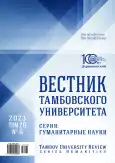Method for determining the effectiveness of the training process of hockey players with specific anthropometric data
- Authors: Zobkov D.A.1
-
Affiliations:
- Derzhavin Tambov State University
- Issue: Vol 28, No 6 (2023)
- Pages: 1523-1531
- Section: RECREATIONAL AND ADAPTIVE PHYSICAL EDUCATION
- URL: https://journal-vniispk.ru/1810-0201/article/view/297888
- DOI: https://doi.org/10.20310/1810-0201-2023-28-6-1523-1531
- ID: 297888
Cite item
Full Text
Abstract
Importance. Methods of analyzing the effectiveness of the training process in game sports always impose certain requirements to the studied components: the quality of tasks performed by athletes, quantitative indicators of correctly accepted in accordance with the coach’s instructions solutions to situational problems in game episodes. A great importance is also the efficiency of the received information, the speed of statistical processing for making operational and strategic coaching decisions. In this regard, the most common information document designed for analytical activities to determine the effectiveness of training or game process in amateur hockey teams is a statistical list, where statisticians mark with icons game interactions of athletes, the degree of their success, the choice of playing position and technical parameters of receiving and passing the puck, won and lost combat sports, strength building, maintaining dynamic balance, etc. At the end of the procedure the results for each hockey player and five players are calculated in order to determine the effectiveness of game interaction, as well as to develop further strategic line of the training process. The inconvenience of this methods is the definition of evaluation tasks (in particular, we are talking about the intensified saturation component within the research topic) for each training process that has a certain target orientation, as well as the low speed of statistical processing of the obtained data. The purpose of the research: to analyze the game interaction of athletes of the hockey team “Derzhava” based on the use of instrumental methods to assess the game actions of representatives of groups of athletes differentiated by anthropometric indicators.Research Methods. Analysis of scientific and methodological literature on the research problem, systematization, pedagogical observation, instrumental diagnostic method “Physical Education Teacher Assessment Instrument”, methods of mathematical statistics, generalization.Results and Discussion. The results of game adaptation of hockey players, referred to different groups of athletes with special anthropometric data at the end of the preparatory period on the basis of individual indicators of game interaction in control games are analyzed.Conclusion. Research results can be used as information for game sports trainers when evaluating competitive game activity in selected sports.
About the authors
D. A. Zobkov
Derzhavin Tambov State University
Author for correspondence.
Email: zebl2989@mail.ru
ORCID iD: 0000-0001-5510-004X
Research Scholar of Adaptive Physical Culture and Life Safety Department
33 Internatsionalnaya St., Tambov, 392000, Russian FederationReferences
- Babushkin G.D., Babushkin E.G. (2000). Formirovanie sportivnoi motivatsii [Sports Motivation Development]. Omsk, 179 p. (In Russ.)
- Davydov A.P., Medvedev V.G. (2017). Characteristics of rapidity of acquisition the puck (taking) in hockey and relations with movement abilities of players. Ekstremal’naya deyatel’nost’ cheloveka = Extreme Human Activity, no. 3 (44), pp. 43-46. (In Russ.) https://elibrary.ru/zttndf
- Davydov A.P., Medvedev V.G. (2017). Characteristics of target accuracy hockey players of different qualifica-tions. Ekstremal’naya deyatel’nost’ cheloveka = Extreme Human Activity, no. 2 (43). pp. 31-34. (In Russ.) https://elibrary.ru/zhlfeh
- Davydov A.P., Medvedev V.G. (2016). Performance efficiency of puck-controlling manoeuvering skills in ice hockey. Teoriya i praktika fizicheskoi kul’tury = Theory and Practice of Physical Culture, no. 12, pp. 68-70. (In Russ.) https://elibrary.ru/xbjsmv
- Davydov A.P., Medvedev V.G. (2018). Methods of video analysis of technical and tactical actions in team sports (by the example of hockey). Materialy Itogovoi nauchno-prakticheskoi konferentsii professorsko-prepodavatel’skogo sostava «Kafedral’naya nauka RGUFKSMiT» [Proceedings of the Final Scientific and Practical Conference of the Teaching Staff “Cafederal Science of Russian State University of Physical Edu-cation, Sport, Youth and Tourism”]. Moscow, Russian State University of Physical Education, Sport, Youth and Tourism Publ., pp. 46-51. (In Russ.) https://elibrary.ru/ywhzpf
- Erlikh V.V., Shibkova D.Z., Baiguzhin P.A. (2020). Digitalization of operational diagnostics of functional re-serves and assessment of athletic fitness. Chelovek. Sport. Meditsina = Human. Sport. Medicine, vol. 20, no. 1, pp. 52-66. (In Russ.) https://doi.org/10.14529/hsm200107, https://elibrary.ru/xdqcqq
- Medvedev V.G., Medvedeva E.M., Davydov A.P., Napalkov K.S. (2023). Informative indicators of motor fit-ness of young hockey players. Teoriya i praktika fizicheskoi kul’tury = Theory and Practice of Physical Culture, no. 1, pp. 8-10. (In Russ.) https://elibrary.ru/qtpurp
- Karas’ A.L. (2023). Pedagogical control of the development of coordinating abilities and skating technical pre-paredness for young hockey players. In: Petrov S.I. (ed.). Materialy 11 Mezhdunarodnogo kongressa «Sport, chelovek, zdorov’e» [Proceedings of the 11th International Congress “Sport, Man, Health”]. St. Petersburg, pp. 482-485. (In Russ.) https://doi.org/10.18720/SPBPU/2/id23-320
- Sergeev S.P., Banayan A.A. (2022). Otsenka tekhniko-takticheskoi podgotovlennosti khokkeinykh vratarei v sootvetstvii s etapami sportivnoi podgotovki [Assessment of technical and tactical preparation of hockey goal-keepers according to the stages of sports training]. Sbornik materialov Vserossiiskoi nauchno-prakticheskoi konferentsii «Sovremennye podkhody i innovatsii v issledovaniyakh molodykh uchenykh v oblasti fizicheskoi kul’tury i sporta» [Proceedings of the All-Russian Scientific and Practical Conference “Modern Approaches and Innovations in Research of Young Scientists in the Field of Physical Culture and Sport”]. St. Petersburg, pp. 111-117. (In Russ.) https://elibrary.ru/kqxmbt
- Kim T.K., Kuz’menko G.I., Ivankov Ch.T. et al. (2022). Organizatsiya i soderzhanie pedagogicheskogo kon-trolya v sportivnykh edinoborstvakh i igrovykh vidakh sporta na primere dzyudo, sambo, karate, khokkeya s shaiboi [Organization and Content of Pedagogical Control in Combat Sports and Game Sports on the Example of Judo, Sambo, Karate and Ice Hockey]. Moscow, Moscow Pedagogical State University Publ., 236 p. (In Russ.) https://doi.org/10.31862/9785426310810, https://elibrary.ru/airlsh
- Iordanskaya F.A. (2018). Functional fitness of athletes in game sports in respect of their game role. Vestnik sportivnoi nauki = Sports Science Bulletin, no. 1, pp. 34-43. (In Russ.) https://elibrary.ru/ynffgx
- Dontsov V.V., Starovoitov Yu.N., Mostovaya T.N. (2019). Bases of a technique of formation sports motivation. Nauka-2020 [Science-2020], no. 3 (28), pp. 96-104. (In Russ.) https://elibrary.ru/oisvyn
Supplementary files








